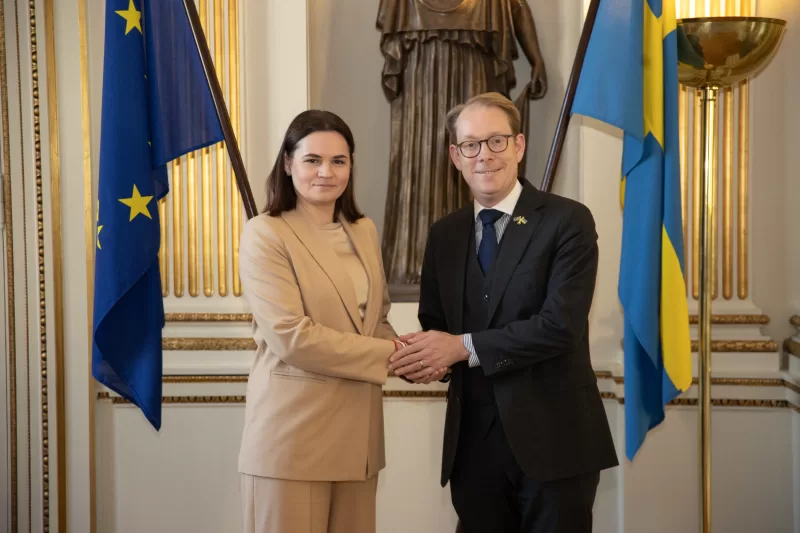Sviatlana Tsikhanouskaya and Tobias Billström wrote a joint op-ed:
The outside world must not forget the people who are fighting for a free, democratic and independent Belarus. Therefore, today, on the International Day of Solidarity with Political Prisoners in Belarus, a two-day conference begins in Stockholm, writes Foreign Minister Tobias Billström and Belarusian opposition leader Sviatlana Tsikhanouskaya.
In autumn 2020, Belarus was in the focus of the outside world. Hundreds of thousands of Belarusians took to the streets after the presidential election, which was neither free nor fair, to peacefully stand up for the right to choose their future. An entire people who had had enough of rigged elections, corruption and absolute power.
Worse situation than ever
But the demonstrations were brutally suppressed, and its leaders were imprisoned or forced into exile. Now, almost four years later, the repression has hardened further in the shadow of Russia’s aggression against Ukraine. With Belarus ceding its territory to Russia’s full-scale invasion, the Lukashenka regime is responsible for an independent act of aggression.
The situation in Belarus today is worse than ever for individuals who raise a critical voice against the system. All forms of political opposition, civil society and independent media are subject to repression. Ordinary people who published a picture from the 2020 demonstrations, follow an independent social media channel or simply expressed a hope for peace in Ukraine risk imprisonment. More than 1,400 people are in prison on political grounds, among them the recipient of the 2022 Nobel Peace Prize, Ales Bialiatski.
The outside world – we – must not forget the people who are fighting for a free, democratic and independent Belarus. It must not stay quiet.
Sweden is acting on the issue
While the Belarusian democratic forces in exile are working tirelessly for a future democratic Belarus, Sweden takes action to keep Belarus high on the international agenda.
First, Sweden is working together with EU partners to adopt additional sanctions as a response to both the extensive domestic repression and the Lukashenka regime’s support for Russia’s aggression against Ukraine. Belarus should not be used to circumvent the sanctions against Russia.
Sweden also supports initiatives for demanding responsibility on the day the conditions for this exist. For example, Sweden supports the International Accountability Platform for Belarus, a civil society initiative that collects and documents evidence of human rights violations in Belarus committed in the period around the 2020 presidential election.
Second, Sweden coordinates its policy with like-minded partners. During 2024, Sweden coordinates the informal Nordic-Baltic and the Nordic cooperation format, NB8 and N5 respectively. We stand together for human rights, democracy and the rule of law. Belarus is naturally one of the Swedish priorities.
Third, Sweden continues to support the Belarusian democratic forces in exile. In November, the ambassador for the Eastern Partnership was assigned to act as the Swedish government’s representative vis-à-vis the Belarusian democratic forces in exile as part of deepening the dialogue between us.
Lukashenka is getting closer to Russia in the shadow of the aggression against Ukraine. This makes the issue of an independent Belarusian identity, culture and language increasingly important.
The future of Belarus is democratic
Today, on the International Day of Solidarity with Political Prisoners in Belarus, a two-day conference on Belarus begins in Stockholm organized by the Ministry of Foreign Affairs and the Center for Eastern European Studies at the Foreign Policy Institute. Among other things, the conference will deal with the national identity of Belarus in Europe today, its language and culture, human freedoms and rights, democracy and the challenges for the Belarusians who are forced to live in exile. As part of the conference, a Belarusian cultural event is held at the House of Culture, which is open to the public.
Belarus is part of Europe, and the Belarusian people have the right to choose their country’s foreign policy direction. There must be a better vision for the country’s future than submission to Russia. The EU has been clear that a future democratic Belarus has a place in the European family.
Our basic demands are clear. The oppression must end. The political prisoners must be unconditionally and immediately released. Support for Russia’s aggression against Ukraine must end. The people of Belarus must be allowed to choose their future in free, democratic elections.
The conference in Stockholm this week is a step in showing that the democratic forces have our continued and long-term support in their quest for a democratic and free Belarus.








